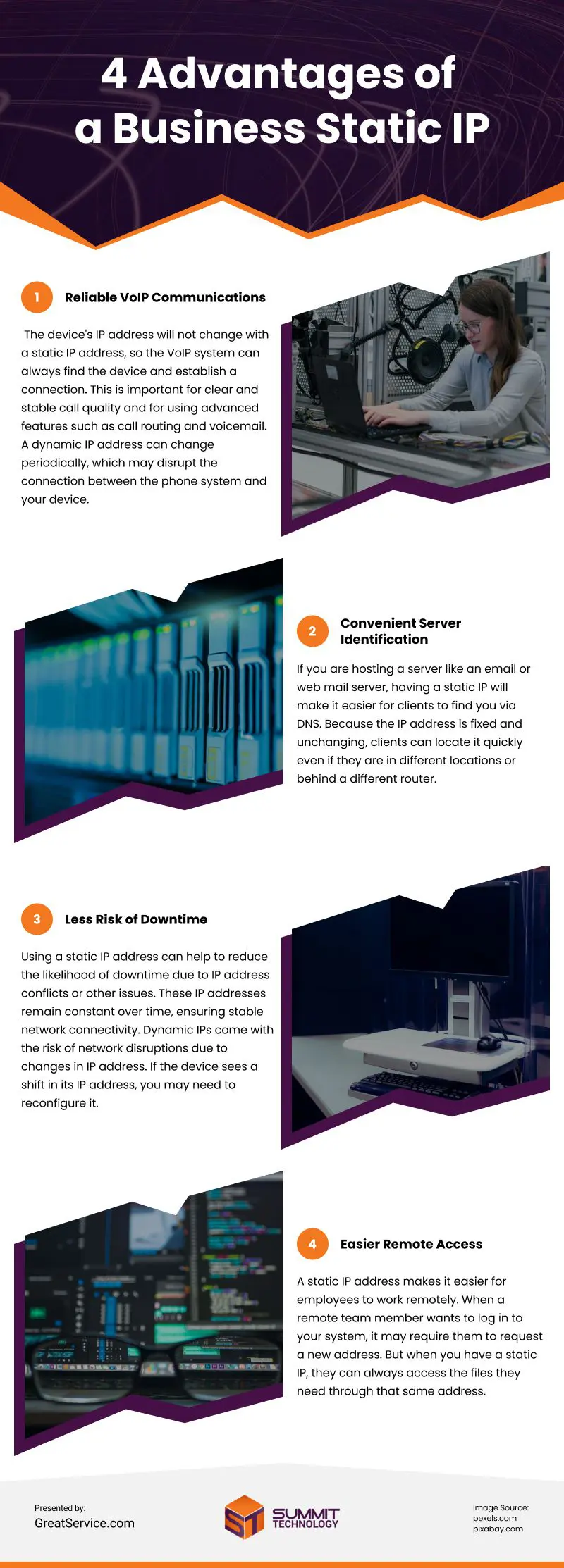If your organization uses a dedicated host server, web server, or VoIP applications, you might want to consider using a static IP. Having one static IP helps you avoid network conflicts that could prevent certain devices from functioning correctly. It’s also beneficial for remote-first organizations—the static IP address makes it easier for personnel working offsite to connect with their employer’s network using a VPN.
But what is a static IP? How does it differ from my company’s standard IP address? We give you answers to these questions and more below.
What is a static IP?
A static IP is a permanently fixed numerical address assigned to a device (such as a computer or router) by an internet service provider. An easier way to understand it is to think of it as a phone number. Just as your phone number is assigned to you and never changes, a static IP is assigned to your device and never changes. This way, people or other devices can always find your device using the same IP address.
A static IP differs from the dynamic IP many businesses use in their day-to-day setting. A dynamic IP address is assigned to a device at the time of connection and changes periodically. This means that the device might have different IP addresses at different times.
ISPs often use dynamic IP addresses to conserve their IP range. They can reassign the address to different devices as they connect and disconnect from the internet.
Why is a static IP beneficial for my enterprise?
There are several benefits to using a static IP for your devices, networks, and servers. These include:
Reliable VoIP Communications
A static IP makes VoIP communications more reliable by providing a consistent and stable connection between the VoIP system and your devices.
When a device uses a dynamic IP address, the IP address can change periodically, which may disrupt the connection between the VoIP system and the device. This can result in poor call quality, dropped calls, and other connection issues.
With a static IP, the device’s IP address will not change, so the VoIP system can always find the device and establish a connection. It ensures that the VoIP system can always reach the device, which is important for clear and stable call quality, as well as for the use of advanced features such as call routing, voicemail, and call forwarding.
Convenient Server Identification
If you are hosting a server like an email or webmail server, having a static IP will make it easier for clients to find you via DNS. Because the IP address is fixed and unchanging, clients can locate it quickly, even if they are in different locations or behind a different router.
In contrast, if a device or network uses a dynamic IP address, its IP address may change frequently, making it more challenging to locate and access using its DNS hostname. With a static IP, you greatly simplify the setup and management of DNS servers, making it convenient for customers to find your websites and services.
Less Risk of Downtime
Using a static IP address can help to reduce the likelihood of downtime due to IP address conflicts or other issues. These IP addresses remain constant over time, ensuring stable network connectivity.
In contrast, dynamic IPs come with the risk of network disruptions due to IP address changes. If the device sees a shift in its IP address, you may have to reconfigure it with a new one, potentially resulting in downtime.
Easier Remote Access
A static IP address makes it easier for employees to work remotely using TeamViewer or other remote access software. When a remote team member wants to log in to your system, it may require them to request a new address if they have an IP address that changes. But when you have a static IP, they can always access the files they need through that same address.
Which equipment and servers require a static IP?
- Web Servers: If you’re using your own server to host your business website, it’s better to use a static IP. A fixed IP makes it convenient to make configurations and also improves website security.
- Email Servers: Hosting email via a static IP server is more secure and private than utilizing a dynamic IP server. A seamless email server also grants you more control over the security of your emails, spam filter, and more.
- FTP Servers: These servers help establish a method of transferring data for personnel connected to a local network. Using a static IP for your FTP will uncomplicate things for both network administrators and staff members.
- Database Servers: Many enterprises house unique information specific to their products or services or sensitive client information such as billing data on these services. Having a static IP for these servers makes it easier for the computer or node to locate where the information resides in the database.
How to get a static IP address?
While dynamic IPs work well for many uses, your business could benefit from upgrading to static IPs. Securing static IP addresses for your business is relatively inexpensive and straightforward. You can set it up yourself by calling your internet services provider and adding static IPs to your services. If you are working with a managed IT services provider like Great Service, they can help you select the best plan or package to outfit your business with static IPs.
Infographic
The static IP address makes it simpler for employees working remotely to connect with their employer’s network via a VPN, which is advantageous for remote-first enterprises. What is a static IP and how does it vary from the IP address used typically by my business? We provide solutions to these and other queries.

Video




